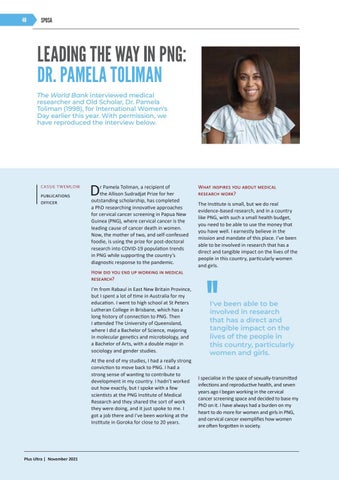4848
SPOSA
LEADING THE WAY IN PNG: DR. PAMELA TOLIMAN The World Bank interviewed medical researcher and Old Scholar, Dr. Pamela Toliman (1998), for International Women's Day earlier this year. With permission, we have reproduced the interview below.
C A SSIE T WEMLOW
publications officer
D
r Pamela Toliman, a recipient of the Allison Sudradjat Prize for her outstanding scholarship, has completed a PhD researching innovative approaches for cervical cancer screening in Papua New Guinea (PNG), where cervical cancer is the leading cause of cancer death in women. Now, the mother of two, and self-confessed foodie, is using the prize for post-doctoral research into COVID-19 population trends in PNG while supporting the country’s diagnostic response to the pandemic. How did you end up working in medical research? I'm from Rabaul in East New Britain Province, but I spent a lot of time in Australia for my education. I went to high school at St Peters Lutheran College in Brisbane, which has a long history of connection to PNG. Then I attended The University of Queensland, where I did a Bachelor of Science, majoring in molecular genetics and microbiology, and a Bachelor of Arts, with a double major in sociology and gender studies. At the end of my studies, I had a really strong conviction to move back to PNG. I had a strong sense of wanting to contribute to development in my country. I hadn't worked out how exactly, but I spoke with a few scientists at the PNG Institute of Medical Research and they shared the sort of work they were doing, and it just spoke to me. I got a job there and I've been working at the Institute in Goroka for close to 20 years.
Plus Ultra | November 2021
What inspires you about medical research work? The Institute is small, but we do real evidence-based research, and in a country like PNG, with such a small health budget, you need to be able to use the money that you have well. I earnestly believe in the mission and mandate of this place. I've been able to be involved in research that has a direct and tangible impact on the lives of the people in this country, particularly women and girls.
"
I've been able to be involved in research that has a direct and tangible impact on the lives of the people in this country, particularly women and girls.
I specialise in the space of sexually-transmitted infections and reproductive health, and seven years ago I began working in the cervical cancer screening space and decided to base my PhD on it. I have always had a burden on my heart to do more for women and girls in PNG, and cervical cancer exemplifies how women are often forgotten in society.






























